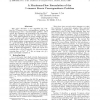Free Online Productivity Tools
i2Speak
i2Symbol
i2OCR
iTex2Img
iWeb2Print
iWeb2Shot
i2Type
iPdf2Split
iPdf2Merge
i2Bopomofo
i2Arabic
i2Style
i2Image
i2PDF
iLatex2Rtf
Sci2ools
129
click to vote
ICCV
1998
IEEE
1998
IEEE
A Maximum-Flow Formulation of the N-Camera Stereo Correspondence Problem
This paper describes a new algorithm for solving the N-camera stereo correspondence problem by transforming it into a maximum- ow problem. Once solved, the minimum-cut associated to the maximumow yields a disparity surface for the whole image at once. This global approach to stereo analysis provides a more accurate and coherent depth map than the traditional line-by-line stereo. Moreover, the optimality of the depth surface is guaranteed and can be shown to be a generalization of the dynamic programming approach that is widely used in standard stereo. Results show improved depth estimation as well as better handling of depth discontinuities. While the worst case running time is O(n2 d2 log(nd)), the observed average running time is O(n1:2 d1:3 ) for an image size of n pixels and depth resolution d.
Coherent Depth Map | Computer Vision | ICCV 1998 | Stereo Correspondence Problem | Traditional Line-by-line Stereo |
Related Content
| Added | 04 Aug 2010 |
| Updated | 04 Aug 2010 |
| Type | Conference |
| Year | 1998 |
| Where | ICCV |
| Authors | Sébastien Roy, Ingemar J. Cox |
Comments (0)

